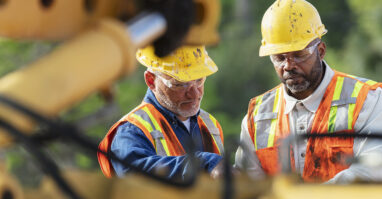Artificial intelligence has already begun to change an industry notorious for being slow to accept change. Over the next decade the construction industry is likely to see explosive growth and evolution, thanks to AI.
The chief innovation officer for the country’s largest construction firm (Turner Construction) earlier this year told Construction Dive that “artificial intelligence will transform our industry in the next 10 years more than any other technology in the past 100 years.”
It is likely that AI will eventually touch nearly every process that construction firms perform. While some of its effects are impossible to predict, it is possible to anticipate some of the key ways that AI is likely to change construction technology, job costs and outcomes.
Here are five ways AI is likely to affect the construction industry:
1. Streamlining data management and site management: AI tools have the potential to improve the speed and accuracy of information flow across many areas of construction. AI can be used to collect and organize a huge amount of data quickly, potentially saving construction firms time and money by streamlining data management. Being able to do things like adjust staffing levels to maximize productivity and track materials across job sites, in real time and on command, is ideal for construction firms in which things can change drastically from day to day. It is also possible that AI will make it easier for construction firms to maintain comprehensive, well-organized, up-to-date financial data. Clearly that becomes very important when firms wish to secure funding for new projects, as well as at tax time.
AI could also be a powerful resource in terms of site management, in particular remote site management. Using AI tools like drones allows construction firm management to closely monitor progress, security and safety of job sites from anywhere.
2. Improving design speed and accuracy to minimize future troubleshooting: AI could prove highly useful for preventing costly, time-wasting errors during the planning and design phases of new construction projects. If a product, material and/or design will not work in real life, AI could flag it so plans can be reworked before construction begins.
Essentially, AI could be used to look way down the road and identify some of the stumbling blocks that might come up for a given project. Resolving those issues early on should prevent some of the job-site mistakes that cause delays and break budgets. Machine learning can also analyze huge quantities of past data and identify ways to achieve greater efficiency and function in future designs.
3. Improving worker and site safety: Worker safety is one of the most critical areas where AI could impact the construction industry. Robotic process automation is already being used to perform some of the more hazardous tasks on job sites, and that technology should continue to advance in interesting ways. Automating more repetitive tasks with RPA helps workers minimize injury and frees up their time for tasks that AI can’t perform. AI tools like sensors and drones should also be increasingly useful for identifying safety hazards on job sites in real time, from detecting harmful chemicals to flagging a worker who isn’t wearing the appropriate safety gear.
4. Supporting sustainability and reducing energy costs: For construction firms striving to go greener, AI is going to be key in the coming decades. AI tools should be able to help companies improve inventory management to minimize material waste, and make it easier to responsibly manage and recycle construction site waste. AI will likely also be useful in helping companies monitor energy consumption to identify areas where energy and other resources are being wasted.
We can also expect many suppliers to use AI to improve their processes to create more sustainable construction materials. For example, timber companies are already using AI to reduce wood waste, use fewer fossil fuels and design strategic logging plans that cause minimal disruption to animal habitats.
5. Simplifying administrative and project management tasks: AI will continue to have a big impact on job sites, but firms are also likely to see some significant changes in their offices too. Automating more administrative tasks may save time by streamlining processes like ordering supplies, generating invoices and onboarding employees, for example. Scheduling is an area that has already been improved by AI, with many construction firms currently using software to automate scheduling with team members, subcontractors, etc. It will be interesting to see how project scheduling is further improved by AI in the coming years.
Ultimately, the hope is that having the ability to use AI to capture and organize all that data will assist contractors and construction firm management in making informed business decisions. For example, AI could make it easier to analyze the real costs of employees before hiring/firing, or analyze the productivity of specific teams when making job assignments. AI will not be a substitute for the contractors and other skilled individuals who actually make the big decisions that keep construction firms running, but rather a tool to help them make those decisions with confidence.
Contact ARB
ARB’s Construction Advisory Services team provides specialized accounting, tax, and advisory services for construction firms and contractors. Knowing the critical role that technology plays for these businesses, we monitor AI advancements in construction along with other industry trends. Understanding today’s construction industry allows us to provide the kind of specific, future-focused guidance that our construction clients will need to thrive over the next decade.
Contact me today if you have any questions or would like to discuss your construction firm’s tax, accounting, and business advisory needs.
by David Jean, CPA, CCIFP, CExP
David Jean is the Director of Altus Exit Strategies and a Principal at Albin, Randall & Bennett, where he is also the Practice Leader of the Succession Planning, Business Advisory, and Construction & Real Estate Services Teams. David works with business owners who want to improve their business’s value before they sell through the Seven-Step Exit Planning Preparation™ process. He has worked with companies from $5 million to $50 million in revenue across a range of industries.





